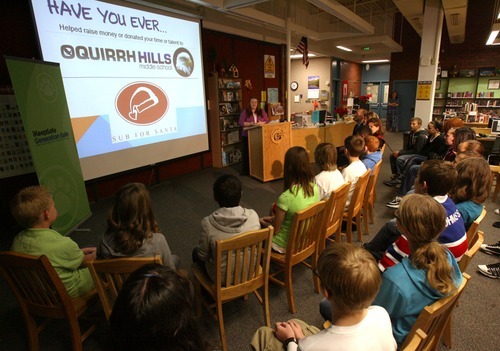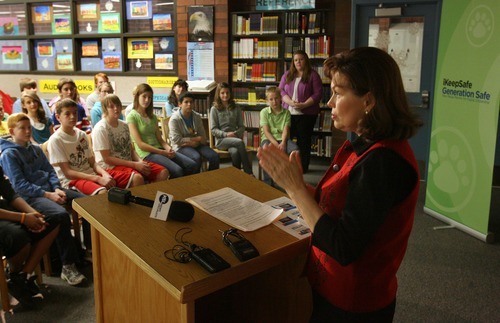This is an archived article that was published on sltrib.com in 2011, and information in the article may be outdated. It is provided only for personal research purposes and may not be reprinted.
Riverton • After a lesson on "digital philanthropy," Oquirrh Hills Middle School student Gabby Gordon said she learned the Internet can be used not only for perusing fashion tips from Seventeen magazine, but also for helping others.
"I can help people who don't have as much as I do," said the 12-year-old.
That's just one of dozens of lessons that former Utah first lady Jackie Leavitt hopes students learn with the statewide launch of Generation Safe, a school program that promotes not only cybersafety but "digital citizenship."
"We need to help students use these fabulous digital devices safely and ethically and in a responsible way," Leavitt said Tuesday at Oquirrh Hills.
Rapid advancements in technology, the proliferation of digital devices and easy access to the Internet have created benefits and risks for youths, she said. Leavitt is founder and chairwoman of the Internet Keep Safe Coalition (iKeepSafe), a nonprofit alliance of policy leaders, educators and advocates.
Schools have been grappling with best practices for a while, and cyber safety is commonly taught in technology classes. But Generation Safe covers the issue in a "more comprehensive" way, said Oquirrh Hills Principal Mike Anderson. The program, which is targeted at middle and junior high schools, is supported by the Utah State Office of Education and private donations. Schools can join for $500 to $1,000 a year, Leavitt said. But she is willing to find alternative funding if a school or district feels the price is out of reach.
Anderson appreciates that the program includes not only the typical "thou shalt nots" — not sharing personal information with strangers or stealing someone's identity, for example — but also teaches students how to use the Internet for good. Technology teachers will get weekly emails with a lesson plan to discuss in class. And they will have access to training opportunities and resources on how to teach the latest topics and technologies.
Generation Safe also includes an "incident response tool" or guide to help administrators respond when students violate policies regarding use of digital devices. The tool could bring "consistency" to the way schools handle troublesome incidents, such as cyberbullying and sharing sexually explicit photos, said Rick Gaisford, educational technology specialist for the State Office of Education.
A flow chart, which has been reviewed by legal experts, explains when schools need to notify parents, when they need to notify law enforcement, and when problems can be handled internally.
Anderson said parents, too, can be part of Generation Safe. He will be inviting PTA members and others to a training for teachers in January.
"Home is where [kids] access the Internet the most," he said.
Gordon, the seventh-grader, said her parents have already set rules for her Internet use at home. She is not allowed to have a Facebook account until she is 13, and her time online is limited to an hour or two per day. She usually accesses the Internet from her smart phone.
Her classmate, Samantha Arens, said she is allowed to use Facebook, but her mother has access to her account and monitors her use about three times a week. Arens said she and her mom have talked about never accepting a friend request from someone Samantha doesn't know and never using Facebook for hurtful gossip.
"I never say negative or mean things about people on Facebook. I think it's just plain rude," Arens said. "You can hurt other people's feelings and get your own feelings hurt, too, if you're feeling guilty about doing it."
Tips for parents
The Internet Keep Safe Coalition (iKeepSafe) has three key tips for parents:
• Keep current with the technology your child uses. A little understanding goes a long way.
• Keep communicating with your child about everything they experience online. Know their lingo and ask when you don't understand a term.
• Keep checking your child's Internet activity. Know where they go online. Let them know the Internet is a public forum and you will be monitoring what sites they visit.
> For more information, go to http://www.ikeepsafe.org.







